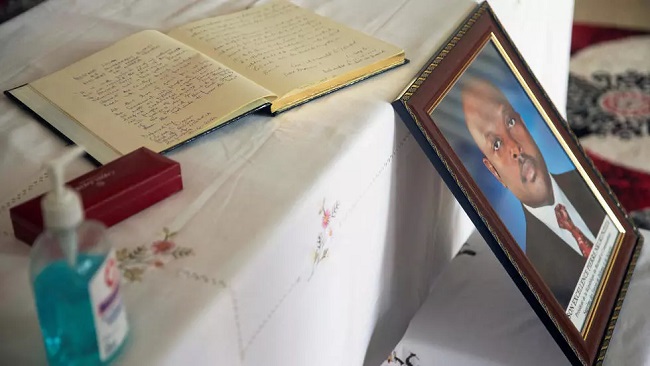Burundi’s strongman Nkurunziza: Your absence is highly appreciated
Burundians were in shock Wednesday after the sudden death of veteran President Pierre Nkurunziza, with rumours circulating and a climate of fear engulfing a country grappling with the complex legacy of his 15-year rule.
Flags in Burundi were lowered to half-mast after the death of the 55-year-old leader, who according to the government died on Monday of a heart attack after feeling unwell for two days.
Wearing face masks and gloves to prevent the spread of the coronavirus, senior government officials, foreign ambassadors and religious leaders lined up to sign a condolence book opened in his memory at the presidential palace.
Nkurunziza’s wife, Denise Bucumi, appeared to be absent. Air ambulance service AMREF told Reuters they had flown her to the Kenyan capital, Nairobi, on May 21 for medical treatment, but declined to confirm widespread reports in Kenyan media that this was for treatment for Covid-19, the disease caused by the coronavirus.
A source in the presidential office, speaking on condition of anonymity, told AFP the first lady flew back to the Burundian capital, Bujumbura, late Tuesday from Kenya. But there was no official confirmation of the report.
The lack of clarity underscored the climate of secrecy and fear that engulfed the impoverished East African nation during Nkurunziza’s rule.
Burundi’s economy is mired in poverty and cut off by international donors after the UN documented the widespread rape, torture and murder of political opponents by ruling party activists and state security forces.
It remains unclear whether the powerful cabal of army generals and security chiefs who propped up Nkurunziza during his 15-year rule remain united over the succession.
‘Supreme guide for patriotism’
Nkurunziza, a fit sports enthusiast and evangelical who believed he was chosen by God to lead the East African nation, leaves behind a country in political and economic turmoil after his divisive rule.
His 2015 run for a third term in office sparked protests and a failed coup, with violence leaving at least 1,200 dead while some 400,000 fled the country.
Amid widespread human rights violations and strict control of the media, Nkurunziza cultivated a personality cult, which saw the ruling party name him a “visionary” and “supreme guide for patriotism”.
Nkurunziza had been due to step down in August after his surprise decision not to run in a May election, which was won by the ruling CNDD-FDD’s handpicked successor, Evariste Ndayishimiye.
‘The sky has crashed down on us’
Members of the ruling party were in shock after the news of Nkurunziza’s death.
“It is a catastrophe, it is as if the sky has crashed down on us. What will become of us without our supreme guide,” one party leader said, sobbing, on condition of anonymity.
Gerard, a party member in Nkurunziza’s home province of Ngozi, told AFP he could not understand how Nkurunziza “had died just like that… we are obliged to believe this official version, but I don’t understand”.
Rumours swirled on social media, with some wondering if he had been poisoned, while others suspecting he had been infected by the coronavirus.
Burundi has largely ignored the pandemic, which Nkurunziza declared had spared Burundi thanks to God.
Under the constitution, the president of the National Assembly, Pascal Nyabenda, should take over on an interim basis before Ndayishimiye’s swearing-in in August.
Nyabenda had been Nkurunziza’s first pick to succeed him but powerful generals in the ruling party chose Ndayishimiye instead.
‘Worried for the future’
Some in the country were gripped by anxiety over what comes next.
“I am very worried for the future of course, because we don’t know what is going to happen in the coming days, if the CNDD-FDD is not going to tear themselves apart over the leadership,” said Raoul, a young opposition supporter who works in a bank, and like many only gave his first name.
However life in Bujumbura had returned to normal after residents rushed home following the news on Tuesday.
“Everything seems normal even if we see groups of people gathered together talking in hushed voices,” said civil servant Jean-Marie, 40.
Gertrude, a teacher living in exile in Rwanda, said she had been “surprised” by Nkurunziza’s sudden death.
“I am not going to cry after everything he has done to us …. extrajudicial executions, torture and all of that, but I regret that he died before being judged for these crimes.”
From sports teacher to president
Nkurunziza was a sports teacher who became a leader in the ethnic Hutu rebellion during the country’s 1993-2006 civil war with the minority Tutsi-dominated army. The war left some 300,000 dead.
He was elected by parliament as president in 2005 and re-elected in a general election in 2010.
His final years in office saw the country placed under sanctions and cut off by western donors, with Burundi ranked by the World Bank as one of the world’s three poorest countries.
Nkurunziza withdrew his country from the International Criminal Court in 2017, and last year shut down a local UN rights office which was probing killings, enforced disappearances and other rights abuses.
More recently Burundi expelled World Health Organization (WHO) staffers despite the coronavirus pandemic.
However, Nkurunziza received praise from his peers on the continent.
South African President Cyril Ramaphosa said Africa had “lost a leader who was devoted to people-centred sustainable development, self-reliance, the sovereignty of his people and country, as well as peace on the continent”.
Kenyan President Uhuru Kenyatta described him as “an exceptional leader in many ways. He was a man of great courage… His perseverance and determination saw him pursue his vision for a peaceful and stable Burundi.”
Condolences also came in from Rwanda, Ethiopia, Djibouti, Niger and Somalia.
(FRANCE 24 with AFP and REUTERS)





